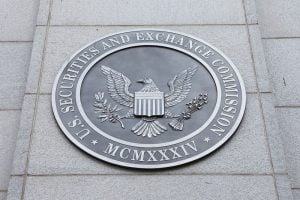Latest news about Bitcoin and all cryptocurrencies. Your daily crypto news habit.

United States Securities and Exchange Commission (SEC) Commissioner, Hester Peirce, delivered a speech before the Medici Conference earlier this month discussing many issues pertinent to ICOs. Mrs. Peirce indicated that the SEC is open to discussion of developing a regulatory sandbox for ICOs, however, expressed a number of concerns surrounding the legislative model. The commissioner also warned of the potentially stifling effect of applying “blanket” classifications to the emerging field of cryptocurrencies.
Also Read: Robinhood App Valued at $5.6 Billion – Now Available in 10 US States
SEC Commissioner Welcomes Discussion of Regulatory Sandboxes
 Commissioner Peirce opened her speech by stating that “Back in Washington, DC, there has been a lot of talk about regulatory sandboxes,” adding that “A number of forward-looking regulators, both here and abroad, have created regulatory sandboxes.”
Commissioner Peirce opened her speech by stating that “Back in Washington, DC, there has been a lot of talk about regulatory sandboxes,” adding that “A number of forward-looking regulators, both here and abroad, have created regulatory sandboxes.”
Mrs. Peirce cites a number of examples of effective regulatory sandboxes, including the United Kingdom – where the Financial Conduct Authority governs a sandbox that “allows businesses to test innovative products, services, business models and delivery mechanisms in the real market, with real consumers,” and Singapore – where the Monetary Authority of Singapore uses regulatory sandbox apparatus to “encourage[e] more Fintech experimentation so that promising innovations can be tested in the market and have a chance for wider adoption, in Singapore and abroad.”
“The motivating notion behind a regulatory sandbox,” Mrs. Peirce asserts, “is that the regulator in a sense sits in the sandbox with the innovator. Not only is she right there to make sure that nobody gets hurt, but she has a front-row seat on the innovative process. She sits at the entrepreneur’s shoulder as he thinks through how to address structural and aesthetic weaknesses in his sandcastle.”
“Talk of sandboxes is welcome, and my fellow regulators’ sandboxes have already yielded great dividends,” Mrs. Peirce added.
Concerns Surrounding Regulatory Sandbox Approach
 Despite expressing her openness to discussion surrounding regulatory sandboxes, the commissioner outlined a number of qualms held regarding the legislative model.
Despite expressing her openness to discussion surrounding regulatory sandboxes, the commissioner outlined a number of qualms held regarding the legislative model.
Mrs. Peirce states that “The regulator may insert itself inappropriately into the creative process,” stressing that “The regulator should be careful not to try to control the development of new technologies. Not only is it outside the regulator’s proper function, but such micromanagement can result in the regulator forcing new technology to fit existing—and familiar—regulatory frameworks regardless of whether those frameworks are appropriate.”
“The law deserves respect, but technological progress should not be bound by the limits of the regulator’s lawyerly imagination,” added Mrs. Peirce.
Commissioner Peirce also outlined concerns that regulatory sandboxes create “the temptation […] for regulators […] to substitute their own judgement for that of consumer and investors,” emphasizing that “Regulators do not need to take on the impossible task of deciding what products and services will win over consumers. The market is efficient at signaling which products and services people want in their lives and which they would rather do without.”
Regulation as Instrumental in Defining the Future Direction of Innovative Technology
 Mrs. Peirce stated that “The world of tokens and ICOs is still in its infancy,” emphasizing that “Determining the appropriate regulatory regime also will mean determining the shape these transactions will take as they mature.
Mrs. Peirce stated that “The world of tokens and ICOs is still in its infancy,” emphasizing that “Determining the appropriate regulatory regime also will mean determining the shape these transactions will take as they mature.
The commissioner added that “While it’s tempting to envision what might come to pass if these concepts were free to develop in whatever way the market dictated, without being pinned down with a label […] there comes a point where regulatory uncertainty is a greater roadblock than confinement within a particular regulatory regime.”
Commissioner Peirce “Wary of any Blanket Designation for all ICOs”
 Mrs. Peirce expressed caution regarding regulators seeking to hastily create a broad label for the dynamic and still emerging ICO sector.
Mrs. Peirce expressed caution regarding regulators seeking to hastily create a broad label for the dynamic and still emerging ICO sector.
After arguing that the majority of “tokens or coins used in initial coin offerings […] look the most like securities,” the commissioner stresses “This is not to say that all ICOs must be deemed securities offerings. Given the undeveloped nature of this area, I am wary of any blanket designation for all ICOs. Instead, the best path forward, at least for the time being, is to evaluate the facts and circumstances of each offering.”
Commissioner Peirce also implied that the SEC will develop a unique apparatus of ICOs deemed to fall under the regulator’s purview, stating “For those ICOs and tokens that do come under the SEC’s jurisdiction, it will fall to us to devise an appropriate regulatory structure for these new types of deals.“
The Regulatory Challenge of Innovation
 Mrs. Peirce stated that “Innovation is always a challenge for regulators. We are used to the way things have been done. Our rules have grown up in response to past technologies. Figuring out whether and how they apply to new ideas is difficult.”
Mrs. Peirce stated that “Innovation is always a challenge for regulators. We are used to the way things have been done. Our rules have grown up in response to past technologies. Figuring out whether and how they apply to new ideas is difficult.”
Commissioner Peirce also warned that regulators “must be careful not to let our lack of familiarity with new technology breed anxiety and therefore bad regulation,” adding that “There is a risk, when something truly innovative comes along, that regulators will focus only on the harms the innovation may bring and miss entirely the opportunity it presents to improve people’s lives.”
At the speech’s conclusion, Mrs. Peirce stated that “The best path forward is for regulators to approach ICOs and tokens with intense curiosity. We must put in the effort to learn about these new technologies and employ the staff necessary to support our understanding.”
“My hope is that we can navigate these new waters collaboratively. The SEC’s role is not to hand out permission slips for innovation. Innovation happens—organically through private decisions and irrepressible human creativity. We at the Commission have a role to play in protecting investors and market integrity by deterring and punishing fraud and setting clear rules. As we sit atop our lifeguard’s stand and survey the beach, however, let’s not lose sight of the benefits new technology can provide in the area of capital formation, market efficiency, economic growth, and overall societal well-being.”
Do you think that a regulatory sandbox for ICOs is a good idea? Share your thoughts in the comments section below!
Images courtesy of Shutterstock, sec.gov
Need to calculate your bitcoin holdings? Check our tools section.
Disclaimer
The views and opinions expressed in this article are solely those of the authors and do not reflect the views of Bitcoin Insider. Every investment and trading move involves risk - this is especially true for cryptocurrencies given their volatility. We strongly advise our readers to conduct their own research when making a decision.